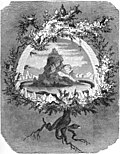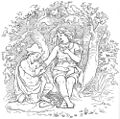Snorri Sturluson (Old Norse: [ˈsnorːe ˈsturloˌson]; Icelandic: [ˈsnɔrːɪ ˈstʏ(r)tlʏˌsɔːn]; 1179 – 22 September 1241) was an Icelandic historian, poet, and...
26 KB (3,008 words) - 04:12, 1 September 2024
tradition in Iceland and for Norse mythology. The Edda has been criticized for imposing Snorri Sturluson’s own Christian views on Norse mythology. In particular...
8 KB (1,019 words) - 23:48, 7 June 2024
Norns (category Wikipedia articles incorporating a citation from the 1911 Encyclopaedia Britannica with Wikisource reference)
life. The Poetic Edda is valuable in representing older material in poetry from which Snorri Sturluson tapped information in the Prose Edda. Like Gylfaginning...
36 KB (3,402 words) - 17:02, 16 June 2024
Baldr (section Poetic Edda)
harbinger of Ragnarök. According to Gylfaginning, a book of Snorri Sturluson's Prose Edda, Baldr's wife is Nanna and their son is Forseti. Baldr had the...
23 KB (2,787 words) - 16:41, 13 July 2024
Heiðrún (category Articles needing additional references from October 2013)
Paleograph Press. ISBN 9785895260272. Young, Jean I. (1964). Snorri Sturluson : the Prose Edda. Berkeley: University of California Press. ISBN 0-520-01231-3...
6 KB (454 words) - 08:55, 29 July 2024
Freyr (section Prose Edda)
represented with a phallic statue in the Temple at Uppsala. According to Snorri Sturluson, Freyr was "the most renowned of the æsir", and was venerated for good...
48 KB (3,840 words) - 04:23, 17 August 2024
Valhalla (section Poetic Edda)
Poetic Edda, compiled in the 13th century from earlier traditional sources, in the Prose Edda (written in the 13th century by Snorri Sturluson), in Heimskringla...
26 KB (3,621 words) - 10:54, 9 September 2024
Sons of Odin (category Articles lacking reliable references from August 2014)
Grammaticus' Gesta Danorum, and in the Gylfaginning section of Snorri Sturluson's Prose Edda. But silence on the matter does not indicate that other gods...
18 KB (2,069 words) - 23:00, 2 September 2024
given below: As noted above, the Prose Edda of Snorri Sturluson makes much use of the works included in the Poetic Edda, though he may well have had access...
26 KB (2,671 words) - 08:05, 3 September 2024
Yggdrasil (section Poetic Edda)
Poetic Edda compiled in the 13th century from earlier traditional sources, and in the Prose Edda compiled in the 13th century by Snorri Sturluson. In both...
26 KB (3,364 words) - 21:48, 4 September 2024
Asgard (section The Poetic Edda)
The Elder Edda : a book of Viking lore. London: Penguin Books. ISBN 9780141393728. Sturluson, Snorri; Byock, Jesse L. (2005). The prose Edda: Norse mythology...
17 KB (2,023 words) - 16:05, 15 September 2024
Ragnarök (section Poetic Edda)
Poetic Edda, compiled in the 13th century from earlier traditional sources, and the Prose Edda, written in the 13th century by Snorri Sturluson. In the...
44 KB (5,435 words) - 02:24, 10 September 2024
Þrúðr (section Poetic Edda)
vol. 7. ISBN 87-7838-008-1. Faulkes, Anthony (1998), edition of: Snorri Sturluson. Edda. Skáldskaparmál. 2. Glossary and Index of Names. London: Viking...
4 KB (502 words) - 19:42, 24 April 2024
Níðhöggr (section Prose Edda)
cognate would be Nithhewer. According to the Gylfaginning part of Snorri Sturluson's Prose Edda, Níðhǫggr is a being which gnaws one of the three roots of Yggdrasill...
9 KB (805 words) - 15:05, 19 June 2024
Skáldskaparmál (category Works by Snorri Sturluson)
[ˈskaultˌskaːparˌmauːl̥]) is the second part of the Prose Edda, compiled by Snorri Sturluson. It consists of a dialogue between Ægir, the divine personification...
28 KB (3,915 words) - 12:22, 2 August 2024
Eir (section Poetic Edda)
the Poetic Edda, compiled in the 13th century from earlier traditional sources; the Prose Edda, written in the 13th century by Snorri Sturluson; and in skaldic...
10 KB (1,145 words) - 22:20, 22 April 2024
Víðarr (section Poetic Edda)
the Poetic Edda, compiled in the 13th century from earlier traditional sources, the Prose Edda, written in the 13th century by Snorri Sturluson, and is interpreted...
13 KB (1,564 words) - 22:10, 31 July 2024
Jötunheimr (section Poetic Edda)
Viking lore. London: Penguin Books. ISBN 9780141393728. Sturluson, Snorri (2018). The Prose Edda. Translated by Brodeur, Arthur Gilchrist. Franklin Classics...
15 KB (1,597 words) - 06:33, 22 May 2024
Ymir (section Poetic Edda)
attested in the Poetic Edda, compiled in the 13th century from earlier traditional material, in the Prose Edda, written by Snorri Sturluson in the 13th century...
23 KB (2,930 words) - 13:50, 21 June 2024
Svartálfaheimr are primarily attested in the Prose Edda, written in the 13th century by Snorri Sturluson. Scholars have noted that the svartálfar appear...
5 KB (531 words) - 19:50, 30 April 2024
Gjúki (category Articles needing additional references from February 2023)
of the Nibelungs, the clan is called the Gjúkungar. In the Prose Edda, Snorri Sturluson says that Gjúki was the father of sons Gunnar and Hogni and a daughter...
2 KB (164 words) - 18:16, 31 July 2024
Bifröst (section Poetic Edda)
Poetic Edda, compiled in the 13th century from earlier traditional sources; as Bifröst in the Prose Edda, written in the 13th century by Snorri Sturluson; and...
13 KB (1,463 words) - 03:56, 8 July 2024
Heimskringla; both written in the 13th century by Snorri Sturluson. In the Poetic Edda and the Prose Edda, Vanaheimr is described as the location where the...
6 KB (616 words) - 12:19, 16 March 2023
Mímir (section Poetic Edda)
the Poetic Edda, compiled in the 13th century from earlier traditional sources, the Prose Edda, written in the 13th century by Snorri Sturluson of Iceland...
10 KB (1,140 words) - 19:37, 12 September 2024
mentioned in the Gylfaginning section of Snorri Sturluson's Prose Edda, chapter 50, possibly by confusion of a reference to Váli, son of Óðinn as binding Loki...
4 KB (323 words) - 12:06, 31 October 2023
Sköll (section General and cited references)
Skǫll, "Treachery" or "Mockery") is a wolf that, according to Snorri Sturluson's Prose Edda, chases the Sun (personified as a goddess, Sól) riding her chariot...
3 KB (382 words) - 18:26, 1 June 2024
Óðr (section Poetic Edda)
with the major goddess Freyja. The Prose Edda and Heimskringla, written in the 13th century by Snorri Sturluson, both describe Óðr as Freyja's husband and...
16 KB (2,093 words) - 18:23, 20 April 2024
Fulla (section Poetic Edda)
the Poetic Edda, compiled in the 13th century from earlier traditional sources; the Prose Edda, written in the 13th century by Snorri Sturluson; and in skaldic...
11 KB (1,286 words) - 22:06, 3 September 2024
the 13th century by Snorri Sturluson. All sources note that the ship is the finest of ships, and the Poetic Edda and Prose Edda attest that it is owned...
8 KB (986 words) - 16:36, 27 August 2024
Skuld (section Poetic Edda)
decide fights." In the Nafnaþulur addition to Snorri Sturluson's Prose Edda the following sections reference Skuld: Antevorta Atropos Orchard (1997:169)...
3 KB (196 words) - 13:39, 27 August 2024























